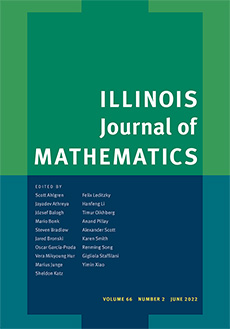Abstract
Let $\mathcal{F}$ be a family of holomorphic functions in a domain $D$; let $k$ be a positive integer; let $h$ be a positive number; and let $a$ be a function holomorphic in $D$ such that $a(z)\not= 0$ for $z\in D$. For $k\not= 2$ we show that if, for every $f\in \mathcal{F}$, all zeros of $f$ have multiplicity at least $ k$, $f(z)=0$ $\Longrightarrow $ $f^{(k)}(z)=a(z)$, and $f^{(k)}(z)=a(z)$ $\Longrightarrow $ $|f^{(k+1)}(z)|\le h$, then $\mathcal{F}$ is normal in $D$. For $k=2$ we prove the following result: Let $s\ge 4$ be an even integer. If, for every $f\in \mathcal{F}$, all zeros of $f$ have multiplicity at least $ 2$, $f(z)=0$ $\Longrightarrow $ $f''(z)=a(z)$, and $f''(z)=a(z)$ $\Longrightarrow $ $|f'''(z)|+|f^{(s)}(z)|\le h$, then $\mathcal{F}$ is normal in $D$. This improves the well-known normality criterion of Miranda.
Citation
Jianming Chang. Mingliang Fang. Lawrence Zalcman. "Normal families of holomorphic functions." Illinois J. Math. 48 (1) 319 - 337, Spring 2004. https://doi.org/10.1215/ijm/1258136186
Information





